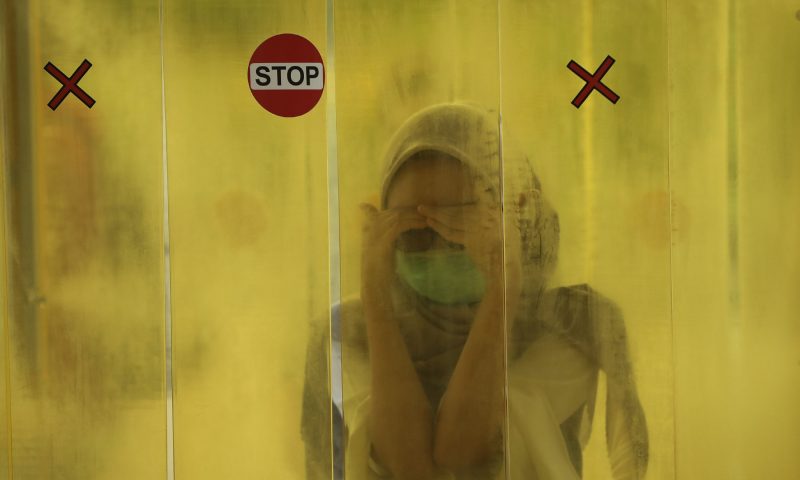The pandemic has changed consumer behavior dramatically.
The outbreak of the coronavirus has dealt a shock to the global economy with unprecedented speed. Following are developments Tuesday related to the national and global response, the work place and the spread of the virus.
________________________
LOSING LUSTER: The coronavirus pandemic has forced the closure of thousands of retail locations and altered consumer behavior dramatically. That combination has led to a very rough stretch for companies that glitter.
— The path of the COVID-19 pandemic was traced fairly closely by the closure of Tiffany & Co. stores across the globe. Revenue in the Asia-Pacific down tumbled 46% during its most recent quarter, then in Europe, by 40%, then in the Americas, by 45%. The famed jeweler swung to a $105 million operating loss.
However in China, where the pandemic began, sales in April rose 30% as cities recovered, and by 90% in May. The rebound in sales may not be as strong elsewhere, according to Neil Saunders, the managing director of GlobalData Retail, because economic growth has been so much stronger in China for years.
— Signet Jewelers, the parent company of such brands as Zales and Jared, said it is permanently closing about 400 stores after reporting slumping sales in three-month period that ended May 2. With all of its stores closed because of the pandemic, same-store sales at Signet Jewelers slid 38.9% in its first quarter. Overall revenue slumped 40.5%, offset somewhat by a 6.7% increase in online sales. A portion of those online activity is being generated by virtual sales, CEO Gina Drosos told The Associated Press. Sales people have done more than 100,000 virtual consultations online since March 23. The company operates more than 3,000 stores worldwide and so far nearly 1,100 have reopened.
— Movado Group’s first-quarter sales declined 52.5%. It has reopened 14 of its 47 stores in North America and expects all but six will open by the middle of next week.
RETAIL ELSEWHERE: Cities hardest hit by the virus have begun to reopen, but restrictions are still in place and more bankruptcies are all but certain.
— Coresight Research now expects between 20,000 and 25,000 stores will be closed this year, up from its most recent estimates of 15,000 closures. Last year, 9,821 store closed. About 55% to 60% of all store closures this year will be mall-based, according to estimates.
— Macy’s released early numbers for its first quarter Tuesday largely in line with previous estimates. Late Monday the retailer said it had secured about $4.5 billion of new financing and it expects to make it through the pandemic.
— Conn’s, which sells furniture, mattresses, home appliances, consumer electronics and home office products, reported its online sales soared more than 700% in the first quarter with people sheltered at home. Same-store sales, however, tumbled 17.6%.
— Best Buy plans to reopen more than 800 of its 1,000 stores next week. The electronics seller had temporarily closed its doors to most customers, only letting those in who made an appointment in advance. About 60 people will be able to shop at a time, or about 25% of capacity. It will still offer curbside pickup, a service it expanded during the pandemic. Best Buy said it plans to rehire more than 9,000 of the 51,000 workers it had furloughed because of the pandemic.
PANDEMIC GIG ECONOMY: After shelter-in-place orders drove rides with Uber and Lyft down 90% in some cities, industry analysts are seeing signs of life in this battered segment of the gig economy. Both ride-sharing companies are experiencing a growth in demand as cities lift restrictions, according to Dan Ives, managing director of equity research at Wedbush Securities.
CENTRAL GOVERNMENTS & CENTRAL BANKS: Economists are expecting the largest economic downturn since the last world war. National governments are trying to determine what will be needed, and the best way to return to growth.
— France’s central bank forecast Tuesday that the country could see 1 million job losses this year, and it will be at least two years before it’s is back to where it was before the virus hit.
The economy could contract 10% this year, or 12% to 13% if the nation is hit with a second wave, central bank chief Francois Villeroy de Galhau told broadcaster France-Info. The economy is expected to rebound by 7% next year, according to new forecasts. Projections have virus-related unemployment peaking in mid-2021, at 11.8%.
SAFETY IN THE WORKPLACE: Two employees at the General Motors assembly plant in Wentzville, Missouri, have tested positive for the novel coronavirus, although the company says they were exposed outside of work. The factory near St. Louis was not shut down, and the company said Tuesday that it believes there’s very little risk that anyone inside has been exposed.
MARKETS: The same stocks that led global markets higher to start the week dragged them down on Tuesday. Cruise lines, hotels, airlines and other travel related stocks all declined.
WATCHING GRASS GROW: Gardening and yard work gained a lot of new adherents during lockdown with so many sheltered at home. Scotts Miracle-Gro now expects sales growth of 16% to 18% this year, far beyond earlier projections for 6% to 8% growth. That growth is led by the U.S., where the company projects growth of 9% to 11%, compared with its previous expectations of between 1% and 3%. Shares recently hit an all-time high.

